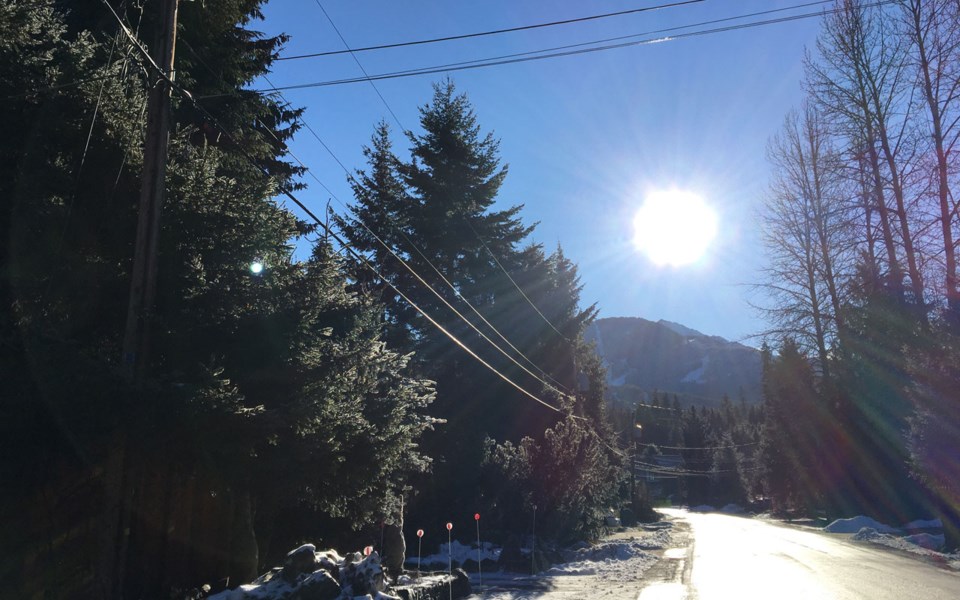After a slight delay, a resident-led project to bury utility lines in White Gold is moving ahead after once again receiving council’s assent on Dec. 1.
The project—which originally passed Nov. 3 (with Councillor Jen Ford opposed) before being brought back for reconsideration by Coun. Cathy Jewett on Nov. 17—has proved controversial in the neighbourhood, with some residents questioning the transparency of the process.
Some owners argue that full individual costs for the work—in some cases reaching as high as $22,500—were not originally known.
The Dec. 1 decision to proceed was not unanimous, with Couns. Ford and Jewett again voting in opposition.
“I feel I made a mistake on Nov. 3 by not opposing it … People are hurting in this town, and these are some of the people that are hurting,” Jewett said.
“So this doesn’t pass, for me, the smell test, particularly during COVID, and the fact that people can’t afford an extra $1,300, let alone an extra [$5,000 to $25,000].”
The Resort Municipality of Whistler (RMOW) estimates about 100 of the neighbourhood’s 160 homes will need to have their services undergrounded for the project, all of them differing in complexity and costs.
Though the true costs for each owner won’t be known until the detailed design stage, the RMOW expects most to be in the low- to medium-cost range, and only about one per cent at the high end of the spectrum.
While homeowners technically can’t opt out of the project, a cheaper option will allow them to install a pole on their property to run a power line above ground to their home (estimated to cost up to $5,000).
The Dec. 1 agenda item was accompanied by a deluge of letters from White Gold residents, with 60 pieces of correspondence on the matter included in the council package: 48 in favour and 22 opposed.
Several residents also raised questions at the Dec. 1 public Q and A.
For Tom Prochazka, the ballpark estimate to hook his house up is $10,000, he said.
“This is on top of the huge added tax burden,” Prochazka said.
“How does council justify forcing even one resident to sell their house due to inability to pay for this unnecessary upgrade?”
Mayor Jack Crompton said he hopes no one has to resort to selling their homes, and noted there are “other avenues that can be pursued like tax deferral.”
The total project cost to White Gold homeowners is estimated at $5.52 million, offset by an $845,000 BC Hydro beautification grant.
Council’s decision was made more difficult by the fact the neighbourhood itself initiated the project.
Under Section 212 of the Community Charter, homeowners may petition a municipality for a “local service area,” with the costs being recovered via an add-on to annual property taxes over a number of years (in this case, a maximum of $1,230 per year over 30 years, according to the RMOW, with the first year of the increase not expected until 2024).
On Sept. 5, 2019, council received a letter from Toni Metcalf, speaking as a resident of the neighbourhood (Metcalf is also the RMOW’s economic development coordinator—she recused herself from the Dec. 1 discussion), expressing the interest of White Gold residents to initiate a formal petition process for the work.
Of 160 total affected properties, 93 voted in favour of the project.
While some residents raised concerns about a 15-day extension given to the petition process due to COVID-caused mail delays, RMOW staff noted in a report to council that the 50-per-cent threshold had already been met by the original Sept. 15 deadline (with 85 “yes” responses).
In response to residents wondering why just four days were given for owners to rescind their “yes” vote, staff noted that step wasn’t actually required in the process.
At the Nov. 3 council meeting, general manager of infrastructure James Hallisey made it clear council had the power to reject the project, despite the successful petition.
”It is really up to council to decide where and how they use municipal resources, including the borrowing that would be required for this project and the staff time that is required to execute the project,” Hallisey said.
“So just to be clear … it is definitely at council’s discretion.”
But in the view of a majority of council, denying the underlying legislative process—and the will of the majority of the neighbourhood—would set a bad precedent.
“A local service area is a provincial process that allows neighbourhoods to add amenities at their own cost. This is their only path to this end,” said Mayor Jack Crompton.
“My understanding is that the neighborhood went through this process in good faith, and they hope they can expect their local government to move along that path that the Community Charter sets out for us.”
Coun. Ralph Forsyth said he’s heard from many people on the issue, and has friends on both sides.
“It’s just amplified the discord in the community. That is very troubling to me, that neighbours are not getting along,” he said.
But councils shouldn’t make decisions based on popularity of projects, Forsyth said.
“Sometimes things are very unpopular and you still have to make decisions,” he said.
“I’m going to make this decision to vote in favour because we followed a process that’s laid out in the charter that keeps council out of having to count the yeses and nos in favour of any project.”
A similar petition process to bury utility lines is currently underway in Alta Vista.




